'This is a historical moment in the political history of Sri Lanka.'
'You can see the amount of pressure that is coming from the people because nobody addressed the policy blunders, multiple corruption charges and huge scandals.'
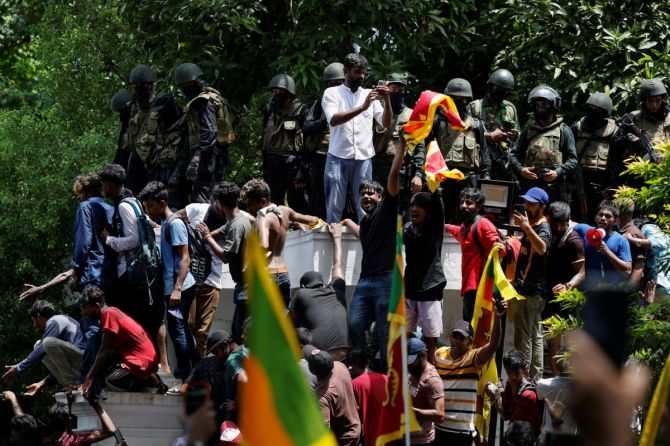
"This is a historical moment in the political history of Sri Lanka," says Asanga Abeyagoonasekera, geopolitical analyst and strategic adviser from Sri Lanka.
Abeyagoonasekera has led two government think-tanks providing strategic advocacy on foreign policy and security in Sri Lanka.
"People were not carrying guns or weapons. They came from all districts. There were mothers and children."
"They were all ordinary people," Abeyagoonasekera tells Rediff.com's Archana Masih in a phone interview from Washington, DC where he is a senior fellow in the Millennium Project.
Part 1 of a multi-part interview:
Is it the end of the Rajapaksas in Sri Lankan politics? Or can they plot a return few years later?
What the Rajapaksas did this time was unbearable. I don't think the Rajapaksas could return again.
Mahinda Rajapaksa should have gracefully exited when he celebrated 50 years in politics in 2020.
But these 70 plus men continued to rule our country when younger people should be getting an opportunity.
When one sees the video of the scene at the airport of former finance minister Basil Rajapaksa being stopped from fleeing the country, you can see that the passengers and immigration officers are angry.
If the new regime prosecutes them on the various corruption charges and the judiciary functions properly, I don't think there will be a comeback for the Rajapaksas.
But we have seen what happened after the Arab Spring when the models put forward did not work in many countries.
Therefore, I have I mentioned from the beginning that Sri Lanka needs a lot of assistance from the international community to get it right.
The country needs technical assistance, functioning independent institutions and a stable government.
India can assist us because it is our closest neighbour and the largest democracy in the world. India even has a democracy fund to the United Nations and can help its immediate neighbour because it is a turning point for Sri Lanka.
It can go in the direction of a heavy militarised Myanmar model because Sri Lanka is very fragile at the moment.
We need to re-democratise. We require help from the US, Japan, European Union and all democratic nations.
If these [democratic] countries give refuge to the Rajapaksas, there is going to be a problem.
Let the judiciary of Sri Lanka decide what happens to the Rajapaksas.
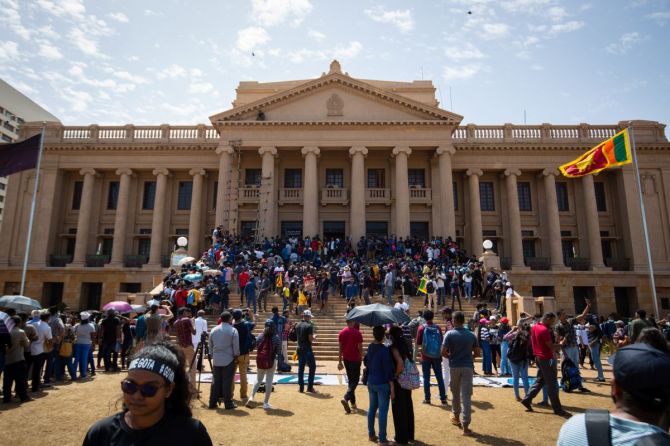
What accounts for the defiance of government officials like the police, immigration officers etc to the Rajapaksas who were all powerful in Sri Lanka till recently?
Is the anger in the country so acute that public servants do not care about reprisals even if the Rajapaksas were to return to power a few years later?
In 2021, I carried out a field study for USAID as a senior researcher.
I interviewed many public officers -- senior secretaries at the ministries to many public officers, including the judiciary.
They spoke on record about the corrupt government of Rajapaksa, interference in independent institutions and the heavy militarisation of the regime.
What Gotabaya followed was a very different model from Sri Lanka's democratic model.
The report was made for internal purposes only because of the sensitivity of the data captured. I wrote an article 'The coming anarchy in Sri Lanka' in June 2021. It was not published in any Sri Lankan media because of the Rajapaksas' interference in the press.
The article was published in India and in other countries. I highlighted what happens to a country when the government interferes with independent institutions and try to militarise.
At that time, Gotabaya pardoned a political criminal serving a prison sentence.
The downfall of the Rajapaksa regime was because of the many policy blunders. He was ill advised by his advisers. The ones who disagreed with the policies were attacked as critics.
Gotabaya Rajapaksa was a former military officer who served as secretary of defence. He had limited political experience when compared to his brother Mahinda, who has about four decades of political experience.
Gotabaya used the Prevention of Terrorism Act to arrest innocent people. Opponents to his regime were tagged as terrorists.
My analysis captured that the country's trajectory was going towards a heavy militarised regime, like Myanmar or Pakistan.
Amazingly, the military of Sri Lanka did not move in that direction and did not support Gotabaya to the extent he wanted.
That is the reason why the people could break from the military parameter and carry on this unprecedent citizens movement.
There was not a single person shot. They were injured. People were not carrying guns or weapons. They came from all districts. There were mothers and children.
This was not a mob. It was a revolution.
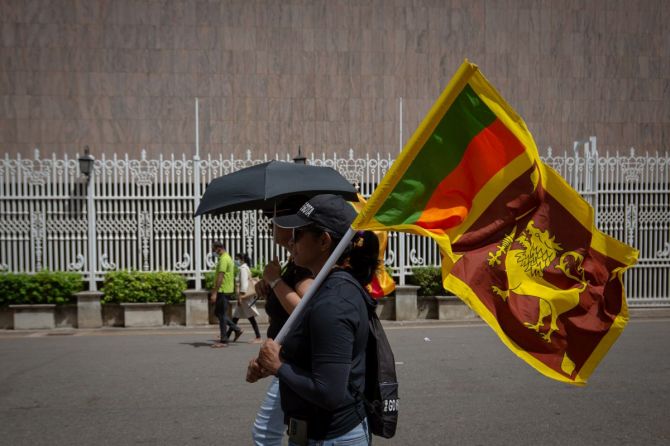
I have interviewed so many people who were in the protest, and they were all ordinary people.
This is a historical moment in the political history of Sri Lanka. You can see the amount of pressure that is coming from the people because nobody addressed the policy blunders, multiple corruption charges and huge scandals.
They did not listen to the protesters and even one week back, the prime minister made a lot of irrational decisions.
He made the right decisions about the IMF, but continued political favouritism.
He appointed a casino boss to the cabinet.
He even said to take a day off and grow vegetables when 22% of the population is hungry and eating only one meal a day, including government servants.
16 people died waiting in fuel queues and one saw footage of the president and prime minister laughing in parliament the last time they were seen together.
All this obviously creates anger. But our people did not to create violence.
Three criteria of the Arab Spring matches with Sri Lanka.
- An autocratic regime.
- Rampant corruption.
- The economic crisis.
The people showed what they could do.
Feature Presentation: Aslam Hunani/Rediff.com
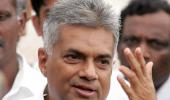



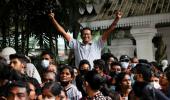




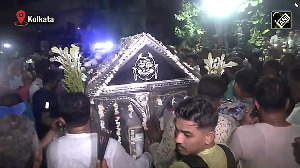

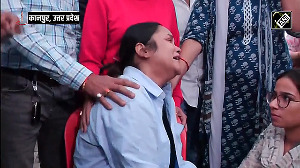
 © 2025
© 2025